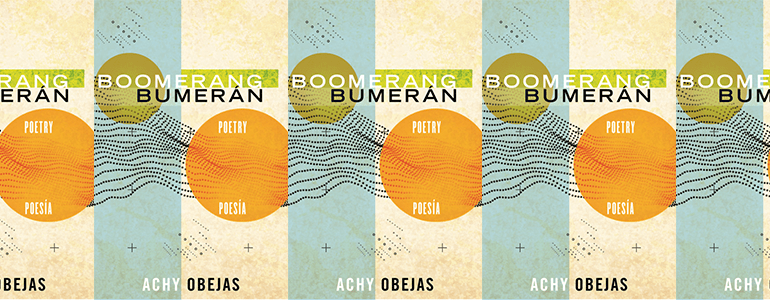Boomerang / Bumerán’s Exploration of the Importance of Writing

Achy Obejas’s Boomerang / Bumerán (2021) includes a poem dedicated to the exiled Cuban author Reinaldo Arenas, who died by suicide after living with AIDS for several years, called “The Land of Regal Elephants.” Obejas writes of “back when you were convinced a cluster of signs, a cadence of perfectly chronicled images—words!—could still save you.” Here we see both Obejas’s belief that words can save her, us, and our world, but also how fragile that belief can be. Obejas further expounds on the importance of words: “You set out to write your autobiography, which will be a collective biography of all the people who were exiled with you.” This is Obejas’s mission, with each poem, each line, each word—to make the world a better place, to let hope live.
Immediately after opening Boomerang / Bumerán, we can see how Obejas undertakes the mission of writing words that could still save her, us, our world. She writes in her author’s note that she does her best to make the text a “gender-free” one. She writes in two languages, to reach all of her homes, all of her people. She writes to figure out and save all of her selves.
In one of the book’s early poems, “Volver,” Obejas writes about coming back to Cuba after her exile. She writes, “you are going back to where it all began, careful to engage in the necessary oblivion of the circumstances that took you away in the first place.” (This mimics her author’s note, in which she discusses trying to create a gender-free manuscript while also noticing points where gender needs to be addressed and used explicitly.) Obejas thinks about how any little change in her story could have kept her in Cuba. She was “on the threshold of what might have been home if not for upheaval, if not for the price of sugar and oil on the world market, if not for the assurance of safety and comfort elsewhere, if not for the revolution and exile.” These what ifs show the horror of living in exile, show how difficult getting the story right is, show how hard it is to find objective truth when you’re so deep into the story yourself.
We see this conflict acutely when Obejas later writes: “you will confuse the beginning and end of the journey, the packing and the unpacking and repacking of your bags. You will forget what you brought to give away and what you brought to put back in its proper place.” Here we witness Obejas trying to figure out how to write about this experience, what to put to paper, what to fully commit to memory, what to commit to inspection for the readers, and what to keep to herself, what to let go away. What will help, and what will hurt?
There is no proper or complete way to tell the story. In the English versions of the book’s poems, Obejas leaves some words and phrases in Spanish. Not just the title, but also the phrase “y aunque no quise regreso, siempre se vuelve,” which translates roughly to, “and although you never want to return, you always come back.” Not everything can be so easily translated—sometimes you can’t translate the phrase in the way it needs to be. So Obejas keeps using Spanish. She recites old poems people are taught and memorize in Cuba, such as Jose Marti’s “Cultivo Una Rosa Blanca.” The poem of Marti’s she quotes is about giving the same to her friends and her enemies. It’s about staying steady, staying balanced. These poems are important to her, helping her process what is happening in her world, in her old home. She keeps the poem in Spanish but changes a little of it to make it gender-free.
Her poems also don’t just include her perspective. She writes from the perspective of her people, the ones she has been exiled from. “We are weeping because there is a hole in the nation where you should have been, a deep and painful hole, a black hole with your name on it,” she writes. And that hole is felt from both sides, with Cuba, her home, being a hole for her.
In the poem titled “You,” Obejas dissects how words can be twisted, manipulated, how they can hurt people. She writes, “War is peace, freedom is slavery—and more importantly—ignorance is strength. That’s right…The less you know, the more protected. The less you know, the more correct you’re bound to be.” She talks about how deadly the chorus can be. How people can unite repeating false and dumbed down rhetoric. “Let the chorus go silent, walk away on a path of your own design and determination, even if you lose your way a few times during the journey,” she writes. “Don’t be afraid of the loneliness.” Here Obejas writes the importance of getting the stories down, of choosing the righteous path with her writing, over that of the emboldened choruses that try to subvert the truth to benefit the privileged and the unaffected.
Later in the poem, Obejas writes: “You have a brutal clarity about the river of tears that brought us here, to you, and how that river flooded.” She then pens a list of places that have faced tragedies to oppressed peoples, from Port-au-Prince to Orlando to Aleppo. Obejas ends the list writing of “how we drank that river water, and how that river poisoned our blood and how that blood became the instrument with which we write the history we bequeath to you.” She writes about the sadness, the trauma, the history as if it were a river, a physical entity that can slowly cut through and erode anything, that can drown anyone. But we also see how her internalization of that trauma allows her to write the stories that are important to her, her people, our world. She has to drink the trauma, let the water join her blood. “Take what you learn, prick your finger and write it down so it can be read as testimony in the days to come,” she writes. “Then read all the proclamations that are entrusted to you; bind them, encrypt them, discuss them, repeat them to everyone you meet.”
Obejas finishes the poem with an affirmation of sorts: “You must accept that you cannot go it alone.” She writes of how she—we—must “listen attentively: how, amid the chaos and uproar, our commitment to each other, to the stories we tell and the battles we fight, there’s a stirring of hope like a fluttering of pages, of wings.” The pages can get us, our minds, our worlds, to fly to better places.
In the last poem of the book, “The March,” Obejas writes, “Much of the text here is adapted from The Black Panthers Ten Point Program, the Delano Manifesto, Equalise It! (a disability manifesto), Martin Luther King Jr.’s ‘I Have a Dream’ speech, Trail of Broken Treaties, The Transfeminist Manifesto, and the Declaration of Independence of the United States.” Obejas uses these lines to write a manifesto of her own. She writes in order to update the lines, in order to update her readers and inform them of these lines, these manifestos. She writes to help herself, her people, and our world become better. “What we seek is a new majority rooted in justice for all whose conscience is committed to ceasing wrongs and doing right,” she writes. “What we want is nothing about us without us. What we want is for each individual to define their own identity and expect that society will respect them.” This is an ongoing struggle, and Obejas knows the importance of it all, which is why she ends her book with the lines: “Nerve and muscle adapt to the rhythmic stimulus of our own noise, the noise we make together. It is true that when in the course of human events, it becomes necessary for one person to connect to another and another and another in order to defend our equality, our difference, our depends, on one another, then[.]” Obejas leaves her last line with no final punctuation, calling everyone to listen to the rhythm, to feel these words, and to continue the struggle, continue the recording, continue the stories. She leaves the rest of the page blank, for all of us to fill.


